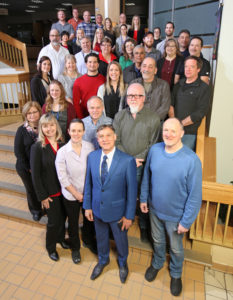
Building department leaders: Best practices lead to great reputation
 Kelowna, a city in the south of Canada’s British Columbia province, is home to more than 130,000 residents within an 80 square mile radius. The city’s building and permitting department made a commitment to achieve International Accreditation Service (IAS) Building Department Accreditation. “We wanted to raise the bar in service provision, quality customer service and citizen safety while reducing the city’s exposure to liability,” explained Mo Bayat, director of the Development Services Department for the city of Kelowna.
Kelowna, a city in the south of Canada’s British Columbia province, is home to more than 130,000 residents within an 80 square mile radius. The city’s building and permitting department made a commitment to achieve International Accreditation Service (IAS) Building Department Accreditation. “We wanted to raise the bar in service provision, quality customer service and citizen safety while reducing the city’s exposure to liability,” explained Mo Bayat, director of the Development Services Department for the city of Kelowna.
The accreditation program is designed for governmental agencies and third parties providing building department services that are proactively seeking to improve their organizations. Participants cite program benefits such as increased efficiencies, improved decision making and enhanced public confidence. “If other municipalities truly believe in excellence in customer service then my advice would be to walk the walk by pursuing the accreditation process and completing it,” said Bayat.
While Bayat recognizes that the accreditation effort was hard work for his team, he sees it as a good investment. “We are viewed as the leading building department within the region due to the increased quality of service and great customer service feedback as the result of accreditation,” he said.
“We are viewed as the leading building department within the region due to an increase of quality of service and great customer service feedback as the result of accreditation.”
— Mo Bayat, Director of Development Services Department, City of Kelowna
Service improvements

Bayat also points to significant improvements that resulted from the accreditation process. One result was to divide the geographic area of the city into fifths and create a team of four professionals for each area, including a plan checker, a building inspector, a plumbing and gas inspector, and an engineering technician. This system allows customers to get to know the appropriate officials in their area, enhancing relationships between customers and staff.
In addition, the outcome of the quality assurance and management control programs inspired by the accreditation process helped Bayat’s team to develop targeted educational programs, both for industry stakeholders and for staff. He says these have been very successful.
Commitment to service excellence
“My team and I are very proud to be an accredited building department,” said Bayat. “We believe that obtaining and implementing the accreditation requirements in our daily service delivery is a testimony to our commitment for service excellence to the industry stakeholders and the citizens of Kelowna.”
For the city of Kelowna, accreditation was a building block to improved planning and processes. If your building department could benefit from new ideas and system enhancements, IAS provides a one-day training program for individuals interested in better understanding the requirements for the accreditation of building departments and third-party providers of building department services.
This article is part of a series from the International Accreditation Service (IAS) profiling building departments and third-party service providers accredited by IAS — a non-profit accreditation body and a subsidiary of the International Code Council. Building Department Accreditation and Building Department Third-Party Service Providers Accreditation are two of the programs offered by IAS to provide evidence that departments have met a national accreditation standard and are competent to provide public safety services for their communities. To learn more about these accreditation programs, visit Building Department Accreditation and Building Department Third-Party Service Providers Accreditation.







